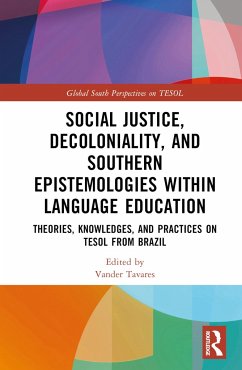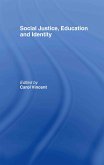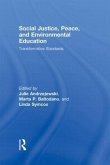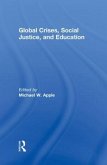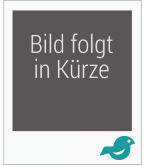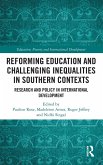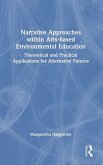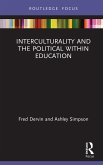Social Justice, Decoloniality, and Southern Epistemologies within Language Education
Theories, Knowledges, and Practices on TESOL from Brazil
Herausgeber: Tavares, Vander
Social Justice, Decoloniality, and Southern Epistemologies within Language Education
Theories, Knowledges, and Practices on TESOL from Brazil
Herausgeber: Tavares, Vander
- Gebundenes Buch
- Merkliste
- Auf die Merkliste
- Bewerten Bewerten
- Teilen
- Produkt teilen
- Produkterinnerung
- Produkterinnerung
With a strong focus on decoloniality and social justice, this volume brings together critical theories, concepts, and practices on TESOL from multiple Brazilian perspectives.
Andere Kunden interessierten sich auch für
![Social Justice, Education and Identity Social Justice, Education and Identity]() Social Justice, Education and Identity214,99 €
Social Justice, Education and Identity214,99 €![Social Justice, Peace, and Environmental Education Social Justice, Peace, and Environmental Education]() Social Justice, Peace, and Environmental Education213,99 €
Social Justice, Peace, and Environmental Education213,99 €![Global Crises, Social Justice, and Education Global Crises, Social Justice, and Education]() Global Crises, Social Justice, and Education185,99 €
Global Crises, Social Justice, and Education185,99 €![Decolonizing Epistemologies and Worldviews in Education Decolonizing Epistemologies and Worldviews in Education]() Decolonizing Epistemologies and Worldviews in Education179,99 €
Decolonizing Epistemologies and Worldviews in Education179,99 €![Reforming Education and Challenging Inequalities in Southern Contexts Reforming Education and Challenging Inequalities in Southern Contexts]() Reforming Education and Challenging Inequalities in Southern Contexts186,99 €
Reforming Education and Challenging Inequalities in Southern Contexts186,99 €![Narrative Approaches within Arts-based Environmental Education Narrative Approaches within Arts-based Environmental Education]() Margaretha HäggströmNarrative Approaches within Arts-based Environmental Education178,99 €
Margaretha HäggströmNarrative Approaches within Arts-based Environmental Education178,99 €![Interculturality and the Political within Education Interculturality and the Political within Education]() Fred DervinInterculturality and the Political within Education64,99 €
Fred DervinInterculturality and the Political within Education64,99 €-
-
-
With a strong focus on decoloniality and social justice, this volume brings together critical theories, concepts, and practices on TESOL from multiple Brazilian perspectives.
Produktdetails
- Produktdetails
- Verlag: Routledge
- Seitenzahl: 252
- Erscheinungstermin: 3. März 2023
- Englisch
- Abmessung: 240mm x 161mm x 18mm
- Gewicht: 546g
- ISBN-13: 9781032365008
- ISBN-10: 1032365005
- Artikelnr.: 66269694
- Herstellerkennzeichnung
- Libri GmbH
- Europaallee 1
- 36244 Bad Hersfeld
- gpsr@libri.de
- Verlag: Routledge
- Seitenzahl: 252
- Erscheinungstermin: 3. März 2023
- Englisch
- Abmessung: 240mm x 161mm x 18mm
- Gewicht: 546g
- ISBN-13: 9781032365008
- ISBN-10: 1032365005
- Artikelnr.: 66269694
- Herstellerkennzeichnung
- Libri GmbH
- Europaallee 1
- 36244 Bad Hersfeld
- gpsr@libri.de
Vander Tavares is a Postdoctoral Researcher in Education, Inland Norway University of Applied Sciences, Norway.
Introduction Part I: Social Justice through TESOL for and from the South
1. Digging up our Stones of Shame: English Language Education and Memories
of Brazil's Violent Past 2. Developing Critical Awareness of Indigenous
Languages and Cultures of Brazil in EFL Education: Children's Literature as
an Entryway Part II: Decolonizing Constructions of TESOL Teacher Education
and Educators 3. Reconstructing Our Teacher Selves through Decoloniality
and Southern Epistemologies 4. Teacher Education Practices within Pibid:
De/Re/Constructing What It Means to Be an English Educator Part III:
Southern-Based Knowledges and Pedagogies 5. Critical Tasks in Brazil:
Locally Produced Epistemologies and Praxis 6. Affect and English Language
Learning in the Global South: Literature-based Teaching Plans created by
Brazilian Teachers Part IV: (Re)Imagining TESOL through Brazilian
Perspectives 7. Thinking ELT Otherwise: Lessons from Decoloniality 8. A
Century of Paulo Freire: Problem-Solving Education, Conscientização,
Dialogue, and TESL from a Freirean Perspective Part V: Confronting the
Hegemony of the English Language in Research and Teaching 9. Realigning
Research Publication Practices in the South: Going Beyond the "Must Publish
in English" Controversy 10. Critical Perspectives of Brazilian Teachers on
English as a Lingua Franca: Rethinking Teaching through Critical Pedagogy
11. African and Afro-Brazilian Cultural Themes as Possible Paths Towards
Decolonizing English as a Foreign Language Education
1. Digging up our Stones of Shame: English Language Education and Memories
of Brazil's Violent Past 2. Developing Critical Awareness of Indigenous
Languages and Cultures of Brazil in EFL Education: Children's Literature as
an Entryway Part II: Decolonizing Constructions of TESOL Teacher Education
and Educators 3. Reconstructing Our Teacher Selves through Decoloniality
and Southern Epistemologies 4. Teacher Education Practices within Pibid:
De/Re/Constructing What It Means to Be an English Educator Part III:
Southern-Based Knowledges and Pedagogies 5. Critical Tasks in Brazil:
Locally Produced Epistemologies and Praxis 6. Affect and English Language
Learning in the Global South: Literature-based Teaching Plans created by
Brazilian Teachers Part IV: (Re)Imagining TESOL through Brazilian
Perspectives 7. Thinking ELT Otherwise: Lessons from Decoloniality 8. A
Century of Paulo Freire: Problem-Solving Education, Conscientização,
Dialogue, and TESL from a Freirean Perspective Part V: Confronting the
Hegemony of the English Language in Research and Teaching 9. Realigning
Research Publication Practices in the South: Going Beyond the "Must Publish
in English" Controversy 10. Critical Perspectives of Brazilian Teachers on
English as a Lingua Franca: Rethinking Teaching through Critical Pedagogy
11. African and Afro-Brazilian Cultural Themes as Possible Paths Towards
Decolonizing English as a Foreign Language Education
Introduction Part I: Social Justice through TESOL for and from the South
1. Digging up our Stones of Shame: English Language Education and Memories
of Brazil's Violent Past 2. Developing Critical Awareness of Indigenous
Languages and Cultures of Brazil in EFL Education: Children's Literature as
an Entryway Part II: Decolonizing Constructions of TESOL Teacher Education
and Educators 3. Reconstructing Our Teacher Selves through Decoloniality
and Southern Epistemologies 4. Teacher Education Practices within Pibid:
De/Re/Constructing What It Means to Be an English Educator Part III:
Southern-Based Knowledges and Pedagogies 5. Critical Tasks in Brazil:
Locally Produced Epistemologies and Praxis 6. Affect and English Language
Learning in the Global South: Literature-based Teaching Plans created by
Brazilian Teachers Part IV: (Re)Imagining TESOL through Brazilian
Perspectives 7. Thinking ELT Otherwise: Lessons from Decoloniality 8. A
Century of Paulo Freire: Problem-Solving Education, Conscientização,
Dialogue, and TESL from a Freirean Perspective Part V: Confronting the
Hegemony of the English Language in Research and Teaching 9. Realigning
Research Publication Practices in the South: Going Beyond the "Must Publish
in English" Controversy 10. Critical Perspectives of Brazilian Teachers on
English as a Lingua Franca: Rethinking Teaching through Critical Pedagogy
11. African and Afro-Brazilian Cultural Themes as Possible Paths Towards
Decolonizing English as a Foreign Language Education
1. Digging up our Stones of Shame: English Language Education and Memories
of Brazil's Violent Past 2. Developing Critical Awareness of Indigenous
Languages and Cultures of Brazil in EFL Education: Children's Literature as
an Entryway Part II: Decolonizing Constructions of TESOL Teacher Education
and Educators 3. Reconstructing Our Teacher Selves through Decoloniality
and Southern Epistemologies 4. Teacher Education Practices within Pibid:
De/Re/Constructing What It Means to Be an English Educator Part III:
Southern-Based Knowledges and Pedagogies 5. Critical Tasks in Brazil:
Locally Produced Epistemologies and Praxis 6. Affect and English Language
Learning in the Global South: Literature-based Teaching Plans created by
Brazilian Teachers Part IV: (Re)Imagining TESOL through Brazilian
Perspectives 7. Thinking ELT Otherwise: Lessons from Decoloniality 8. A
Century of Paulo Freire: Problem-Solving Education, Conscientização,
Dialogue, and TESL from a Freirean Perspective Part V: Confronting the
Hegemony of the English Language in Research and Teaching 9. Realigning
Research Publication Practices in the South: Going Beyond the "Must Publish
in English" Controversy 10. Critical Perspectives of Brazilian Teachers on
English as a Lingua Franca: Rethinking Teaching through Critical Pedagogy
11. African and Afro-Brazilian Cultural Themes as Possible Paths Towards
Decolonizing English as a Foreign Language Education

